I didn’t get out to the ballpark as much as I would have liked to in 2019. In fact, I only had one truly memorable outing and it was a cool Monday evening last July spent in the grandstand at Fraser Field in Lynn, Massachusetts with Bill Terlecky.
Terk was a lifer with 40 seasons in minor league baseball. As he was quick to point out, he was one of just a handful of guys to run ball clubs at virtually every developmental level of the modern game, from triple-A affiliated teams in Rochester, Maine and Scranton/Wilkes-Barre to independent ball teams in Indiana and Wisconsin. His final – and professed favorite – stop was with the summer collegiate North Shore Navigators in Lynn.
When I sent Bill a cold email last summer asking if he’d like to talk about his life in baseball, I knew that he was gravely ill. After missing the 2018 Navigators season on medical leave, Bill stopped treatment for cancer and made the decision to return for a final summer running the Navs. I’d hoped Bill might have the energy to chat with me for 20 minutes during batting practice. Instead, he spent nearly seven innings with a total stranger talking shop in the stands.
As we talked, the squad of 20-somethings and college interns that made up the rest of Navs front office came up to Bill for advice every 5-10 minutes. At one point during the evening, Futures Collegiate Baseball League officials e-mailed out a roster for the league’s All-Star Game to be played the following week in Pittsfield. One of the Navs’ two young Assistant General Managers, Joe Gill, strode up to Bill, reading the list off his iPhone with outrage rising in his voice.
“This has got to be a mistake! They’ve left out __________,” the front office worker insisted, defending the honor of some anonymous Division II New England collegian. He rattled off the young man’s hitting stats and rankings, seemingly from memory. “And he’s got probably the best arm in the league!”
The aggrieved young man suggested calling the league office to argue his case. Bill coached him to follow his instincts. Joe stalked off toward Fraser Field’s tiny press box and returned 10 minutes later in triumph. The jilted Navigator was on the All-Star team now. Joe re-stated his earlier talking points about the player’s batting stats and defensive prowess, basking in victory. “Great work,” Bill encouraged.
##
Editor’s Note:
Bill’s career brought him into proximity with some of Minor League Baseball’s wildest stories of the 1980’s. Terk was part of the Rochester Red Wings front office when that team played the longest game in baseball history, a 33-inning marathon against the Pawtucket Red Sox in 1981. He was General Manager of the Williamsport Bills in 1987 when a little-used Bills catcher carved a decoy potato to pick a runner off third base. And he was a key figure in a years-long effort and fierce legal battle to bring triple-A baseball to Scranton, Pennsylvania.
Our conversation covered the Potato Incident and the Scranton deal without providing the background most readers would need to follow those events. Click on the links above for the backstories.
Bill Terlecky spoke with Fun While It Lasted on July 8th, 2019. This version of the interview was transcribed from audio and has been edited substantially for length and lightly for clarity.
Bill retired from baseball at the end of the North Shore Navigators season in August 2019. He passed away on October 4, 2019. At the bottom of the page, you will find links to several other remembrances and articles on his life & career.
Bill Terlecky:
It’s interesting, if you went back … I’m sure there’s more defunct teams that I’ve worked than those that are still out there. There’s no more Waterbury Indians. We were the Williamsport Bills, a double-A team in Williamsport. That’s not there. We were the Maine Phillies. They’re not there. Scranton changed their name. The Binghamton Mets, they changed their name. I’m the king of the defunct and name-changed ball clubs.
They’re trying to obliterate all knowledge of me!
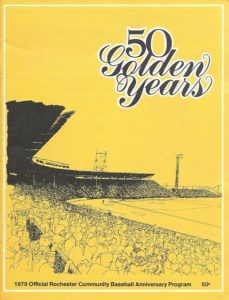
FWiL:
But you started with one of the most enduring minor league teams in history. How did you end up in Rochester, New York?
Bill Terlecky:
I got a job at the 1978 Baseball Winter Meetings in Orlando. The Rochester Red Wings were hiring off the convention floor. You’re right. To go into that setting and that atmosphere … that was just a storied franchise and you learned so much. I don’t know how a guy could have gotten a better place to start. Just unbelievable.
FWiL:
What was your first role or title in Rochester?
Bill Terlecky:
Sales. Sales. They gave me a phone book and a street guide. Yup. And they said ‘Go ahead and starting calling. And if you sell enough to pay for yourself, maybe we’ll keep ya.’
FWiL:
That was my experience as well. A Yellow Pages sitting on my desk when I started my first day on the job. Did you have a particular mentor in Rochester?
Bill Terlecky
Bob Drew was the guy that hired me. He was the General Manager and the broadcaster for the Red Wings. I learned a whole heckuva a lot from Bobby and he became a good friend. I eventually took his place because he got caught up in a proxy fight.
FWIL:
Was that because of the community ownership of the Red Wings?
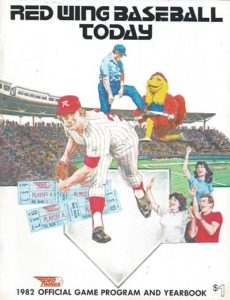
Bill Terlecky:
There was all kind of in-fighting about what was going to happen to Silver Stadium. There was a group that wanted to try to preserve [it], which eventually even those people turned around. But they did put money into Silver first and that caused a big stink. Bob was on the pro-Silver Stadium side and the board was the pro new ballpark side. And Bobby got bounced.
So all of a sudden there were two 27-year old guys who became co-General Managers. Me and a guy by the name of Bob Goughan. We did that for three years and then that got old to be honest with you. I wanted my own deal. I was damned determined that I wanted to do a start up. A brand new one in a new stadium. I was hell bent.
Harold Cooper, who was the President of the International League at the time, made a couple of recommendations to John McGee, a guy who was trying to bring triple-A ball to Scranton, Pennsylvania, for who he might want to hire to be his GM. I got the job.
FWIL:
Now when McGee hired you [in 1985], he knew he wanted to go into Scranton at that point right?
Bill Terlecky:
Oh yeah. There was no doubt.
FWiL:
It seemed like you were the General Manager in waiting for that team for a number of years, right?
Bill Terlecky:
Four!
FWiL:
That’s got to be almost unprecedented.
Two years of double-A in Waterbury, Connecticut. Then we pulled up stakes – that’s when we thought we had control of the triple-A franchise. We set up shop in Williamsport in January of 1987 thinking we were gonna be triple-A. In mid-March the judge overturns the deal and the Phillies triple-A ends up back in Old Orchard Beach, Maine. And we ended up with the double-A Tribe [Cleveland Indians] in Williamsport. Then the next year we won the case. I went to Maine and ran the Maine Phillies triple-A team and we still ran the double-A club in Williamsport.
Think about this …we relocated that double-A franchise in March [1987]! Would Minor League Baseball allow that today? We had been operating as the triple-A Phillies in Williamsport since January. Now we lose the case and we got permission to take the Indians double-A team we owned out of Waterbury and put it into Williamsport right before the season. It was strange.
FWiL:
So you spent a summer in Old Orchard Beach [Maine]. What are your memories of The Ballpark?
Bill Terlecky:
The mosquitos were horrendous. The atmosphere … you had no roof or anything. It was serviceable. Today? You’d be lucky to get a Class A club in there. That’s a tough nut up there.
FWiL:
I feel like there was a generation of ballparks that got built around the country in the mid-80’s, including The Ballpark at Old Orchard Beach, that for a year or two were considered a huge step forward. These weren’t the Depression-era ballparks that everyone had been recycling for 50 years. They might have cost $1.5 million or two million bucks. And then a couple years later the real building boom starts and the standards change. And now you’ve got ballparks that people were really excited about in 1984 or 1985 but by 1987 or 1988, people are saying ‘we’ve got to get out of this thing’.
Is that accurate?
Bill Terlecky:
Yeah. The suites weren’t in those parks, even though I don’t know that those ended up being that great of an idea. They were a little more spartan. And then right in the early 90’s, boy lookout. That’s when the palaces started getting built.
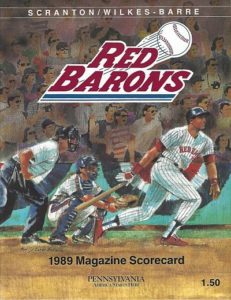
FWiL:
So in 1989 you finally get into Scranton, Pennsylvania after four years of maneuvering. So where did Lackawanna Couty Stadium fall in that spectrum? Because that ballpark feels like it was built right on the cusp of that change.
Bill Terlecky:
Lackawanna County Stadium was outdated the day it opened. The upper decks were so steep that after the first four or five rows, nobody wanted to sit there. It went straight up. That’s how they were building them then. Right after that, the trend went back towards the Camden Yards model. And the minor league ballpark construction trend became one level with 10,000 seats and your suites above.
In Scranton, it was almost like we had two ballparks. We had two monstrous decks. The upper level was a nightmare. They cut some money at the end of the construction. They cut out this membrane in between their third level and the second level where the suites were. And the water would come down and rush in like it was a waterfall.
Scranton wasn’t like some of the new [minor league ballparks]. It missed by a year or two. It really did.
FWiL:
In those four years that you spent waiting, did you second guess latching on with this group and leaving Rochester?
Bill Terlecky:
Yeah. There was some anxiety. The one good thing was that I never got the feeling that the project wasn’t going to happen. Eventually we were going to get there. Even later people didn’t get it. They thought that I worked for all these different places. I said “No! It was the same thing”. I wasn’t bouncing around every other year.
FWiL:
As in, ‘Hey – I don’t get fired every year.’
Bill Terlecky:
Yeah! Exactly.
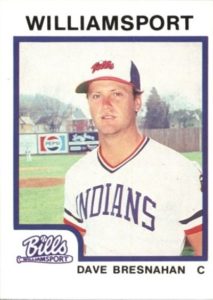 FWiL:
FWiL:
But if you hadn’t bounced through all those cities, you would not have been involved in the Potato Incident. What are your memories of the Potato Incident with Dave Bresnahan and the Williamsport Bills?
Bill Terlecky:
Yeah, Brezzie. We were all busy during the game. It’s not like we were warned. He caught us all by surprise. All of a sudden you hear all this yelling and you run out there and you’re trying to figure out what the heck happened.
The most vivid memory I have of it hasn’t anything to do with that night when he threw the potato. It was the next game. Of course, we told fans they could get into the next game with one dollar and a potato. To this day I can still visualize the floor of the box office covered in potatoes. You could not see the floor.
The media coverage was unbelievable. He was on Letterman and stuff like that. ESPN two years ago did a whole feature on it, but there’s no film or footage of it. They did some animations.
FWiL:
Was he a flaky guy? Did it catch you by surprise that it would be him out of anybody on that team?
Bill Terlecky:
No, we weren’t surprised. Nobody was surprised by that. You know, he was hitting .158. He knew that it was over. If he wanted to go out with a flair, he certainly he did.
FWiL:
I think that was hit last year in professional baseball.
Bill Terlecky:
It was his last minute. The Indians released him.
FWiL:
And Scranton was a big hit.
Bill Terlecky:
That was a difficult spot. Because by the time the dust settled in Scranton the franchise was owned by the county government.
FWiL:
And why was that?
Bill Terlecky:
They claimed in order for them to fund the building of it that they had to own it. Nobody else in the country had that going on, but that was the deal. The county paid. They bought the team. That made us county employees and that made the stadium nothing more than a political pawn for the Commissioners.
FWiL:
That was by opening day of the first year? So John McGee never got to see … all those years of fighting he never got to see it to the starting line?
Bill Terlecky:
By the time the stadium opened, his group, Northeast Baseball was out of it and it was being controlled by the Lackawanna County Stadium Authority.
We were subject to public bidding laws, all that stuff. They wanted to let myself and Rick Muntean go at the end of the first year because they wanted to put their own big political guy in there. They figured they needed us the first year. But the media lost their mind and literally saved our jobs.
FWiL:
So you were there from ’89 until … how long did you stay?
I left in April of ’97.
Madison [Wisconsin] had joined the Northern League in ’96. I had always told [Northern League founder] Miles Wolff, because my wife was from Wisconsin, that I’d be interested in running something. The whole independent thing I had an interest in. He called me in March right before the 1997 season and he says ‘Hey look. I need somebody to go to Madison right now and hold that thing together. I’m going to take over, the league’s gonna own it.’
I said ‘OK, here we go’.
FWiL:
How did you like indy ball compared to working double-A and triple-A? You had a couple cracks at it.
Bill Terlecky:
You know, they both have their things that are cool about them. If pressed, I would tell you that beyond a shadow of a doubt, independent ball was a lot more fun. They were your guys. You were more invested in the winning and losing because they were more invested in it. In triple A, nobody wanted to be there. That was OK – we got that.
But they were all good. They all had their plusses. It was really fun watching a guy get called up to the Big Leagues. But there was just something maybe to my personality about kind of that French Foreign Legion independent baseball thing. You know – ‘off we go!’ Any time somebody started describing something as ‘upstart’, I wanted to be involved.
There aren’t many guys that you could say have done affiliated, independent and collegiate summer. There’s a few of us now, not many.
This one here [North Shore Navigators of Lynn, Massachusetts] just seems like just a special one. We really had to breathe some life into this thing. We still have our nights like this on a weeknight, but on our fireworks days we do a couple thousand, we do fine.
And you know, Andy, having done it, there’s that other benchmark: we’re profitable. Say what you want about how we do it, but guess what? We’re making money. That’s one of my lines. The most important number is the bank deposit at the end of the night.
FWiL:
Yeah, well I look at the outfield wall here [billboards] compared to Brockton’s…
Well, see I do things that some teams won’t do. Number one – there’s trades out there on the wall. But you know, I have every postgame meal paid for by trades. And I don’t even think about it. If I ever could sell the sign great, but then I have to pay for the meal, so… If somebody tells me he’s got a grand and that’s all he can do and I know if I don’t sell it, the sign’s gonna sit empty, I sell it. Other guys won’t do that.
I pass out tickets that admit six. Why am I going to give you one? You’re not going to use that. I juice Opening Night and we do close to 3,000 people. It sets the tone for the rest of the year. All the sponsors and advertisers see that crowd. If you don’t draw fans, you don’t have a chance selling in the offseason.
[Navigators owner] Pat Salvi has got the team up for sale. There’s no way that whoever buys it is going to come in and do some of the things I did. They’re not going to operate like that. And they are probably going to say ‘This guy is a fucking idiot. I can’t believe he did this.’
Once again – we made money here.
FWiL:
Did you ever have an offer or a desire to try a sport other than baseball?
Bill Terlecky:
No.
I tell our interns that it comes down to this. If you enjoy being at the ballpark, then there’s nothing that you will have to do this summer that you will care about. But if you don’t like being here, then there are going to be some things that I’m going to ask you to do that you won’t like.
But for me, I would have done whatever I had to do. Just let me stay here and work. I’ll do anything.
FWiL:
Did you ever have Major League aspirations or were you always happy to be in the Minors?
Bill Terlecky:
Never. Never even tried. I figured out early on that they are two totally different industries. Being a minor league General Manager for eight years doesn’t qualify you one lick to be the Director of Marketing and Promotions for Big League baseball team even though you may think that’s the case.
But it’s not as if I was some huge minor league aficionado. Like I said, the first game I ever saw, I worked at.
FWiL:
So you’ve done New York, Pennsylvania, New England, Wisconsin … you’ve done what almost everyone has to do. You’ve moved all over the country to stay in the game. How do you feel about that itinerant life and the sacrifices that come along with that?
Bill Terlecky:
Well … When you consider that I might have been a little different than some baseball guys. Yes, it was important to me to be a Triple-A GM. But I really didn’t like living in Scranton. So it was no problem for me to leave. I wanted more. I wanted a combo of a nice place that I liked living and running the team. But there were times that I’d be starting over in a new town and I’d wonder ‘What have I gotten myself into again? How does this happen?’
But when I would go somewhere my idea was that I was going to stay forever. I never went anywhere that I wasn’t going to stay forever. Then something always happened and off I went someplace else. Whether I pissed off the owner or the owner pissed me off or somebody had a better idea.
FWiL:
Where was your favorite place to live?
Bill Terlecky:
Here without a doubt. Oh, it’s not even close. Here and Madison.
But in each place, it’s like yeah, but if I didn’t leave here, then I wouldn’t have done that. So I don’t have any regrets about it because the stuff I did in each place I wouldn’t have experienced otherwise.
FWiL:
And where do you live here on the North Shore [of Massachusetts]?
Bill Terlecky:
Swampscott, about a mile away. I never in my wildest imagination thought that I would live two blocks from the beach and get to run a baseball team.
That’s why the whole thing with my health is unfortunately kind of bitter. Like I said, everywhere I’ve gone something has always come up. About a year or so ago I’m thinking to myself ‘There can’t be anything that’s gonna mess this one up’. And then it came at me from another angle.
FWiL:
And you’ve had bouts prior to this one?
Bill Terlecky:
This is my fifth go around with cancer. I grew an inoperable tumor. Can’t operate on it, can’t get it, and then the chemo wouldn’t reduce it.
I gave up the chemo about two months ago because it wasn’t working and I had no life. I’d get out of bed and I’d make it to the couch and that’d be it. I decided I wanted to be able to come to the ballpark one more summer and go to the beach. It’s hard for me though because I always said I would do this job until I physically couldn’t do it anymore. And I didn’t think that it would happen this quickly. I was ready to go another five years minimum. I mean, Hell, we were on a roll here. Let’s go!
FWiL:
Do you think [former Navs owner] Pat Salvi would have kept the team longer if you hadn’t gotten ill?
Bill Terlecky:
I have no doubt.
FWiL:
Other than your positive experiences here on the North Shore, what are some of your fondest memories from your career?
Bill Terlecky:
The fondest memory without a doubt is the fact that my son grew up at the ballpark and was with me a lot and experienced all of this. We were talking yesterday and I told him ‘Next year will be the first year of your life that your Dad doesn’t work for a baseball team.’
I had never been to a minor league baseball game until Opening Day in Rochester in 1979. We had 9,000 people there and Carlos Lopez stole home and it was like ‘Wow’!
The opening of the ballpark in Scranton was huge. The ’95 [International League] All-Star Game – hosting that.
I enjoyed Binghamton – the franchise had fallen a little bit and was held in a bit of a bad light in the community. In my own mind I always want to fix one up or start one and Binghamton was a bit of a fixer upper.
Just being able to come back here after almost screwing up and then having a really good run. I’ll be honest, I had maybe a little chip on my shoulder that I couldn’t get anybody to listen to me. Here’s a guy – I had 30-some years of successful experience. I wasn’t happy. So for me to come here and this to run as well as it has … it’s like ‘OK, I guess I’m not as dumb as you all think I am.’
###
In Memoriam – Bill Terlecky 1953-2019
- 1991: International League Executive-of-the-Year (Scranton/Wilkes-Barre Red Barons)
- 2003: Fred Cashen Award for Top Executive in New York Mets Organization (Binghamton Mets)
- 2018: Futures Collegiate Baseball League Executive-of-the-Year (North Shore Navigators)
Wilkes-Barre (PA) Citizens Voice Remembrance (Donnie Collins 10/5/2019)
Lynn (MA) Daily Item Remembrance (Harold Rivera, 10/4/2019)
Ballpark Digest obituary (Kevin Reichard, 10/4/2019)
###

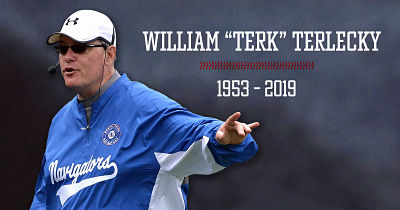


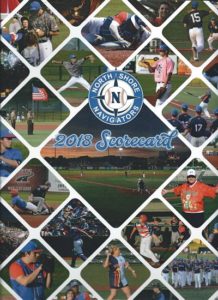
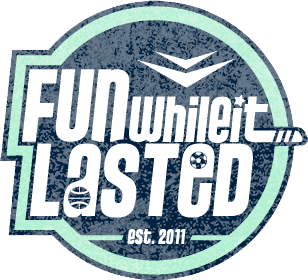
One Response
Wow !! I’m speechless he truly was a AMAZING Man !! I can’t believe how impressed I am of his career!! I was lucky to have known him & his AMAZING Son & Wife !! My Son & his Son are BFF !!!!